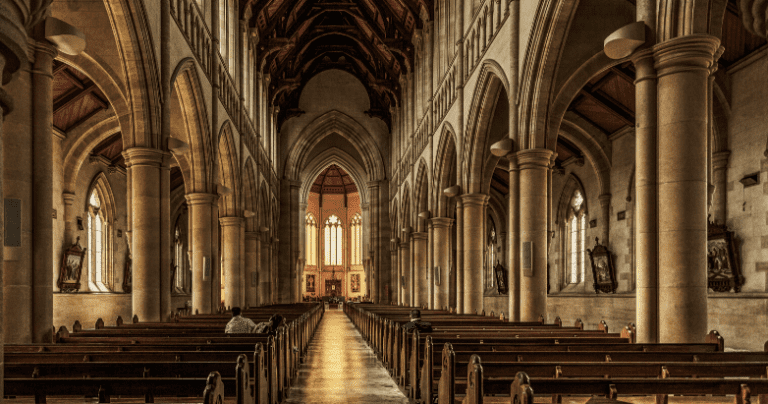
Gospel of Matthew #1: devotional guide
JANUARY 28, 2022 BY ROB DALRYMPLE
A devotional guide to the Gospel of Matthew [1]
Week 1
Monday: Read Matt 1:1-25
The second word in the Greek text of Matt 1:1 is the word geneseos, which might be woodenly taken as “Genesis.” The word is used as a title for the book of Genesis (Gen 2:4; 5:1). This suggests that 1:1 is likely a title for the Gospel of Matthew and not just the intro to the genealogy that follows. A good translation for Matt 1:1 would be something along the lines of: “the book of the story of Jesus.”
Okay, I know that you are not going to read the genealogy and that you will skip immediately to 1:18 and conclude that today’s reading was quite easy! Well, how about if you go back and note the following things from the genealogy.
First, it should be read in three parts—which many translations recognize by putting paragraph breaks before verse 2, in the middle of verse 6, and before verse 12. We know that this is how the genealogy breaks down because Matthew tells us in 1:17.
Also, note that it has 14 generations in each section. Furthermore, each of the three sections are arranged in accord with major epochs of Israelites history (Abraham and the establishment of the Jewish people; to David and the Monarchy; then to the exile). Jesus is the point in which the history of Israel has reached its climax!
NB: the determinetruth podcast on Feb 8, 2022, will highlight all of this and provide more insights into the significance of all this.
Finally, note the presence of women in the genealogy! That should strike us as odd.
Matthew, then, is tying the story of Jesus to the larger story of Israel: from Abraham to David to the exile to Jesus. (There is even more to it than this; so check out the podcast for more details).
This means that when the angel declares to Joseph that, “He will save His people from their sins” (1:21), we should not read this in light of our western, individualism. That is, it is not talking about our personal sins that lead us to separation from God. It is addressing the sins that led the people of Israel into exile from the land.
Matthew’s introduction makes it clear: salvation is coming to Israel! Jesus has come to bring the exile to an end and to establish the long-awaited kingdom of God.
Questions to ponder/discuss: Look through the genealogy and note the prominence of women in the genealogy. Why do you suppose that Matthew went out of his way to include these women? Did you notice that four of the women in the genealogy were gentiles (non-Jews)? What might be the significance of this? (hint: think “kingdom of God”)
NB: I will be speaking at this zoom conference on Feb 11 & 12. Click here to register for this FREE event.
Tuesday: Read Matt 2:1-23: Hosea 11:1-12
Matthew 1:18-2:23 is an interesting text for the discussion of biblical interpretation. The reason is that in this section Matthew provides five fulfillment passages. In these fulfillment passages, a significant event in the life of the people of Israel is recast in terms of the Jesus story—as though the OT story was a “prophecy” about Jesus.
Most intriguing is the flight of Joseph, Mary, and Jesus to Egypt (1:13-15). One of the difficulties that arise here is that Matthew says, “that the prophet might be fulfilled” (1:15). Matthew, however, cites Hosea 11:1 as the “prophecy” that is being fulfilled. The problem (at least for us it appears to be a problem—though it is important to note that Matthew clearly did not think that this was a problem) is that Hos 11:1 is not a prophecy. It is a historical reminiscence. It is a reminder of when God brought His people out of Egypt.
Another difficulty with this verse is that Matthew appears to use Hos 11:1 to describe Jesus’ family leaving Judea and going to Egypt (this is of course highly disputed in the scholarly world). But the “prophecy” in Hos 11:1 relates to the Israelites leaving (or going “from”) Egypt.
Another example of the oddity of Matthew’s “fulfillment” passages is in 2:23. Here Matt says, “This was to fulfill what was spoken through the prophets: ‘He shall be called a Nazarene.’” Note that Matthew says, “the prophets” (plural). This is a clue that something is going on. The “problem”—at least for us—is that there is no prophecy in the OT that says this.
How might we reconcile all this? I think the answer is simple: Matthew (and all the NT writers are doing this) is reading the entire story of the OT (from Abraham to the exile) as fulfilled in Jesus! It is not a particular verse here or there. It is the whole story. And it is about Jesus.
NB: we will address this on the determinetruth podcast on Feb 15, 2022.
Therefore, Matthew can apply Hos 11:1 to Jesus. It is as if Matthew is saying, “what God did for Israel, He did for Jesus. Or to say it another way, If Jesus is Israel (embodying the people of God), then what happened to them may be applied to Jesus. In fact, as we will continue to note as we proceed through Matthew, the story of Jesus is the story of Israel being retold through the lens of the One through whom the fulfillment came!
This means that we too must learn to read the OT through the lens of Jesus. Of course, this doesn’t mean that we do not also continue to read the OT in light of its own context and story.
NB: we will note, however, when we get to the study of John, that the fulfillment of the story does not stop at Jesus! The story continues through the people of God (us) today. Without this understanding, we would be missing the significance of the NT story and message for the church today.
Questions to ponder/discuss: The killing of the innocent in 2:16-18 reminds us of another king/ruler that killed the innocent children of Israel. Any recollections?
(hint: for you older folks: think Charlton Heston: for you younger folks: google Charlton Heston) What does reading the story of Jesus as the fulfillment of the story of Israel mean for us today?
Wednesday: Read Matt 3:1-17
In case we were not convinced that the story of Jesus is about the coming of the kingdom of God, we need to look no further than John the Baptist’s affirmation, “Repent, for the kingdom of heaven is at hand” (3:2).[2] Since the coming of the kingdom of God includes the “forgiveness of sins” (1:21), it only stands to reason that one must “repent” to enter.
The significance of “repent” for the story of Jesus and the kingdom is profound. If this is the only pre-requisite for entering the kingdom of God, then it means that anyone can gain membership into the kingdom of God—provided that they repent! This is why the “good news” is good news to the poor, the widow, the leper, and the tax collector. Such persons were considered “outsiders” by the ruling elite in Jerusalem. Jesus says that entrance is for all—including them! (We will see the significance of this for the Roman world in the Gospel of Luke).
This is why John the Baptist rails against those who considered themselves exempt from repentance (Pharisees and the religious elite) because they considered themselves as already being the children of Abraham (3:9).
We should also note that repentance cannot be mere words. Nor does repentance stop when the prayer is over. John urges, “bear fruit in keeping with repentance” (3:8). Repentance acknowledges that Jesus is Lord and that His kingdom is just. Then, genuine repentance lives as though this is indeed true.
Finally, note that the “good news” is not all good news. John the Baptist goes on to explain that the evidence that the kingdom of God is at hand is that, “The axe is already laid at the root of the trees; therefore every tree that does not bear good fruit is cut down and thrown into the fire” (3:10). Those who fail to repent, those who rely on their lineage, or any other alleged credential, will be cut down.
Questions to ponder/discuss: Repentance is not merely acknowledging that Jesus is Lord. Perhaps you have already done that. It includes living it out daily. This means that repentance is an ongoing activity and that the fruit of repentance is reflected in our daily living. What do you need help repenting for and living in accordance with? Ask the Lord for help. Also, find a trusted friend that you will pray for you, encourage you, and keep you accountable in this area.
Thursday: Read Matt 4:1-22: See: Deut 8:3; 6:16; 6:13
After His baptism, Jesus is led by the Holy Spirit to the wilderness (4:1). Lest we think that this is a sweet story of God leading His people as a shepherd leads his flock, we would do well to recognize that the wilderness is a place of trial and testing. Yep, the Holy Spirit is leading Jesus into a war zone. And the enemy, the arch-villain himself, the Satan is awaiting Him there!
The point of the story is that Jesus is facing the same temptations to which Israel succumbed when they journeyed in the wilderness. The only difference is that Jesus succeeds where Israel failed.
Note that each of Jesus’ responses to the devil corresponds to Moses’ response to Israel’s failures in the wilderness (Deut 8:3; 6:16; 6:13). In each case, the text indicates how Israel should have responded to their temptations but did not. But we need not fear, for Jesus was faithful. As a result, the new people of God have been established.
Questions to ponder/discuss: What do you think was a key factor that enabled Jesus to be faithful and overcome His temptation (and I mean for us to think beyond the fact that He was divine)? What struggles do you have with sin and temptation that you need to surrender to the Holy Spirit?
Friday: Read Matt 4:23-5:48
Note that Matt 4:23 and 9:35 are virtually identical statements. This is what is known as an inclusio. In an ancient work, an author would use an inclusio (an identical or near-identical phrase at the beginning and the end of a section or the whole work) in order to frame a section: i.e, it marks the beginning and the end of the section/book. This allows the hearers of the text to know what the subject of a section is and when the author is transitioning to a new subject.
The importance of this inclusio cannot be understated: the boundary is 4:23-9:35. The reason for noting this is that Matt 5-7 is often singled out as the famed “Sermon on the Mount.” But Matthew tells us that 8:1-9:35 must be included in our discussion of the Sermon on the Mount—the section does not end in 7:29.
A simple way to summarize this section is that in Matt 5-7 Jesus tells us about the kingdom of God, and 8:1-9:35 He shows what the kingdom of God looks like. Thus, the miracles of Jesus are just as important to understanding the kingdom of God as the teachings of Jesus are.
We know that 5:1-7:29 (Sermon on the Mount) is on the topic of the kingdom by examining the beatitudes (5:3-9). Note they begin and end with a promise that “theirs is the kingdom of God”—an inclusio.
A summary of this Sermon might be that Jesus tells us what kingdom people look like—they are poor in spirit and merciful—and what kingdom people do—they hunger and thirst for God’s justice—and as a result, they are persecuted.
Note that the beatitudes are paired in groups of 3/2. The first 3 bestow a blessing on the humility of the poor. The next 3 grant a blessing to those who pursue justice. And the final 2 extend blessing to those who create peace.
(The “9th beatitude” is applied specifically to the disciples—note “you”—and is a supplement to the other eight).
In the sermon, Jesus does not abolish the Law (5:17), but He does intensify it. For Jesus, it is not merely murder or adultery that is the problem, it is the heart that creates the situation that leads to murder and adultery.
The question becomes, then, how are we able to do this? If not murdering is hard enough, then how are we supposed to not have “hatred” in our hearts? The answer is: we must “ask, seek, and knock” (7:7). Then, He will provide the Spirit. As long as we rely on the Spirit and “seek first His kingdom and His righteousness” (6:33), He will strengthen us. As Paul says, we can do “all things through Christ Jesus who strengthens us” (Phil 4:13).
For a deeper dive into the sermon on the Mount see:
My YouTube presentations (4-5 hours)
See Glen Stasson, Living the Sermon on the Mount
Questions to ponder/discuss: Memorize the beatitudes and reflect on them regularly Practice the Lord’s prayer daily
To receive auto-updates when new posts go live sign up for the newsletter on the top right-hand side of the homepage.
NB: My goal is to keep these posts free of charge. I do not intend to ever hide them behind a paywall. I can only do this if those of you who have been blessed by them and can afford to give ($5, $10, $25, or more/month) do so. You can give a tax-deductible contribution by following this link.
Please share this post and let others know about determinetruth.
[1] This guide is meant to be done either as a group study over the course of 2 or 4 meetings (Day 1-5; 6-10; 11-15; 16-20) or as a private devotion over the course of 4 weeks (or a calendar month—5 lessons per week).
[2] Note that Matthew uses “kingdom of heaven”, while Mark and Luke prefer the kingdom of God. One explanation for this is that a good Jew would not use the Name of God. Thus, they substituted “heaven” for God. After all, heaven is where God’s throne is.
A devotional guide to the Gospel of Matthew [1]
Week 1
Monday: Read Matt 1:1-25
The second word in the Greek text of Matt 1:1 is the word geneseos, which might be woodenly taken as “Genesis.” The word is used as a title for the book of Genesis (Gen 2:4; 5:1). This suggests that 1:1 is likely a title for the Gospel of Matthew and not just the intro to the genealogy that follows. A good translation for Matt 1:1 would be something along the lines of: “the book of the story of Jesus.”
Okay, I know that you are not going to read the genealogy and that you will skip immediately to 1:18 and conclude that today’s reading was quite easy! Well, how about if you go back and note the following things from the genealogy.
First, it should be read in three parts—which many translations recognize by putting paragraph breaks before verse 2, in the middle of verse 6, and before verse 12. We know that this is how the genealogy breaks down because Matthew tells us in 1:17.
Also, note that it has 14 generations in each section. Furthermore, each of the three sections are arranged in accord with major epochs of Israelites history (Abraham and the establishment of the Jewish people; to David and the Monarchy; then to the exile). Jesus is the point in which the history of Israel has reached its climax!
NB: the determinetruth podcast on Feb 8, 2022, will highlight all of this and provide more insights into the significance of all this.
Finally, note the presence of women in the genealogy! That should strike us as odd.
Matthew, then, is tying the story of Jesus to the larger story of Israel: from Abraham to David to the exile to Jesus. (There is even more to it than this; so check out the podcast for more details).
This means that when the angel declares to Joseph that, “He will save His people from their sins” (1:21), we should not read this in light of our western, individualism. That is, it is not talking about our personal sins that lead us to separation from God. It is addressing the sins that led the people of Israel into exile from the land.
Matthew’s introduction makes it clear: salvation is coming to Israel! Jesus has come to bring the exile to an end and to establish the long-awaited kingdom of God.
Questions to ponder/discuss: Look through the genealogy and note the prominence of women in the genealogy. Why do you suppose that Matthew went out of his way to include these women? Did you notice that four of the women in the genealogy were gentiles (non-Jews)? What might be the significance of this? (hint: think “kingdom of God”)
NB: I will be speaking at this zoom conference on Feb 11 & 12. Click here to register for this FREE event.
Tuesday: Read Matt 2:1-23: Hosea 11:1-12
Matthew 1:18-2:23 is an interesting text for the discussion of biblical interpretation. The reason is that in this section Matthew provides five fulfillment passages. In these fulfillment passages, a significant event in the life of the people of Israel is recast in terms of the Jesus story—as though the OT story was a “prophecy” about Jesus.
Most intriguing is the flight of Joseph, Mary, and Jesus to Egypt (1:13-15). One of the difficulties that arise here is that Matthew says, “that the prophet might be fulfilled” (1:15). Matthew, however, cites Hosea 11:1 as the “prophecy” that is being fulfilled. The problem (at least for us it appears to be a problem—though it is important to note that Matthew clearly did not think that this was a problem) is that Hos 11:1 is not a prophecy. It is a historical reminiscence. It is a reminder of when God brought His people out of Egypt.
Another difficulty with this verse is that Matthew appears to use Hos 11:1 to describe Jesus’ family leaving Judea and going to Egypt (this is of course highly disputed in the scholarly world). But the “prophecy” in Hos 11:1 relates to the Israelites leaving (or going “from”) Egypt.
Another example of the oddity of Matthew’s “fulfillment” passages is in 2:23. Here Matt says, “This was to fulfill what was spoken through the prophets: ‘He shall be called a Nazarene.’” Note that Matthew says, “the prophets” (plural). This is a clue that something is going on. The “problem”—at least for us—is that there is no prophecy in the OT that says this.
How might we reconcile all this? I think the answer is simple: Matthew (and all the NT writers are doing this) is reading the entire story of the OT (from Abraham to the exile) as fulfilled in Jesus! It is not a particular verse here or there. It is the whole story. And it is about Jesus.
NB: we will address this on the determinetruth podcast on Feb 15, 2022.
Therefore, Matthew can apply Hos 11:1 to Jesus. It is as if Matthew is saying, “what God did for Israel, He did for Jesus. Or to say it another way, If Jesus is Israel (embodying the people of God), then what happened to them may be applied to Jesus. In fact, as we will continue to note as we proceed through Matthew, the story of Jesus is the story of Israel being retold through the lens of the One through whom the fulfillment came!
This means that we too must learn to read the OT through the lens of Jesus. Of course, this doesn’t mean that we do not also continue to read the OT in light of its own context and story.
NB: we will note, however, when we get to the study of John, that the fulfillment of the story does not stop at Jesus! The story continues through the people of God (us) today. Without this understanding, we would be missing the significance of the NT story and message for the church today.
Questions to ponder/discuss: The killing of the innocent in 2:16-18 reminds us of another king/ruler that killed the innocent children of Israel. Any recollections?
(hint: for you older folks: think Charlton Heston: for you younger folks: google Charlton Heston) What does reading the story of Jesus as the fulfillment of the story of Israel mean for us today?
Wednesday: Read Matt 3:1-17
In case we were not convinced that the story of Jesus is about the coming of the kingdom of God, we need to look no further than John the Baptist’s affirmation, “Repent, for the kingdom of heaven is at hand” (3:2).[2] Since the coming of the kingdom of God includes the “forgiveness of sins” (1:21), it only stands to reason that one must “repent” to enter.
The significance of “repent” for the story of Jesus and the kingdom is profound. If this is the only pre-requisite for entering the kingdom of God, then it means that anyone can gain membership into the kingdom of God—provided that they repent! This is why the “good news” is good news to the poor, the widow, the leper, and the tax collector. Such persons were considered “outsiders” by the ruling elite in Jerusalem. Jesus says that entrance is for all—including them! (We will see the significance of this for the Roman world in the Gospel of Luke).
This is why John the Baptist rails against those who considered themselves exempt from repentance (Pharisees and the religious elite) because they considered themselves as already being the children of Abraham (3:9).
We should also note that repentance cannot be mere words. Nor does repentance stop when the prayer is over. John urges, “bear fruit in keeping with repentance” (3:8). Repentance acknowledges that Jesus is Lord and that His kingdom is just. Then, genuine repentance lives as though this is indeed true.
Finally, note that the “good news” is not all good news. John the Baptist goes on to explain that the evidence that the kingdom of God is at hand is that, “The axe is already laid at the root of the trees; therefore every tree that does not bear good fruit is cut down and thrown into the fire” (3:10). Those who fail to repent, those who rely on their lineage, or any other alleged credential, will be cut down.
Questions to ponder/discuss: Repentance is not merely acknowledging that Jesus is Lord. Perhaps you have already done that. It includes living it out daily. This means that repentance is an ongoing activity and that the fruit of repentance is reflected in our daily living. What do you need help repenting for and living in accordance with? Ask the Lord for help. Also, find a trusted friend that you will pray for you, encourage you, and keep you accountable in this area.
Thursday: Read Matt 4:1-22: See: Deut 8:3; 6:16; 6:13
After His baptism, Jesus is led by the Holy Spirit to the wilderness (4:1). Lest we think that this is a sweet story of God leading His people as a shepherd leads his flock, we would do well to recognize that the wilderness is a place of trial and testing. Yep, the Holy Spirit is leading Jesus into a war zone. And the enemy, the arch-villain himself, the Satan is awaiting Him there!
The point of the story is that Jesus is facing the same temptations to which Israel succumbed when they journeyed in the wilderness. The only difference is that Jesus succeeds where Israel failed.
Note that each of Jesus’ responses to the devil corresponds to Moses’ response to Israel’s failures in the wilderness (Deut 8:3; 6:16; 6:13). In each case, the text indicates how Israel should have responded to their temptations but did not. But we need not fear, for Jesus was faithful. As a result, the new people of God have been established.
Questions to ponder/discuss: What do you think was a key factor that enabled Jesus to be faithful and overcome His temptation (and I mean for us to think beyond the fact that He was divine)? What struggles do you have with sin and temptation that you need to surrender to the Holy Spirit?
Friday: Read Matt 4:23-5:48
Note that Matt 4:23 and 9:35 are virtually identical statements. This is what is known as an inclusio. In an ancient work, an author would use an inclusio (an identical or near-identical phrase at the beginning and the end of a section or the whole work) in order to frame a section: i.e, it marks the beginning and the end of the section/book. This allows the hearers of the text to know what the subject of a section is and when the author is transitioning to a new subject.
The importance of this inclusio cannot be understated: the boundary is 4:23-9:35. The reason for noting this is that Matt 5-7 is often singled out as the famed “Sermon on the Mount.” But Matthew tells us that 8:1-9:35 must be included in our discussion of the Sermon on the Mount—the section does not end in 7:29.
A simple way to summarize this section is that in Matt 5-7 Jesus tells us about the kingdom of God, and 8:1-9:35 He shows what the kingdom of God looks like. Thus, the miracles of Jesus are just as important to understanding the kingdom of God as the teachings of Jesus are.
We know that 5:1-7:29 (Sermon on the Mount) is on the topic of the kingdom by examining the beatitudes (5:3-9). Note they begin and end with a promise that “theirs is the kingdom of God”—an inclusio.
A summary of this Sermon might be that Jesus tells us what kingdom people look like—they are poor in spirit and merciful—and what kingdom people do—they hunger and thirst for God’s justice—and as a result, they are persecuted.
Note that the beatitudes are paired in groups of 3/2. The first 3 bestow a blessing on the humility of the poor. The next 3 grant a blessing to those who pursue justice. And the final 2 extend blessing to those who create peace.
(The “9th beatitude” is applied specifically to the disciples—note “you”—and is a supplement to the other eight).
In the sermon, Jesus does not abolish the Law (5:17), but He does intensify it. For Jesus, it is not merely murder or adultery that is the problem, it is the heart that creates the situation that leads to murder and adultery.
The question becomes, then, how are we able to do this? If not murdering is hard enough, then how are we supposed to not have “hatred” in our hearts? The answer is: we must “ask, seek, and knock” (7:7). Then, He will provide the Spirit. As long as we rely on the Spirit and “seek first His kingdom and His righteousness” (6:33), He will strengthen us. As Paul says, we can do “all things through Christ Jesus who strengthens us” (Phil 4:13).
For a deeper dive into the sermon on the Mount see:
My YouTube presentations (4-5 hours)
See Glen Stasson, Living the Sermon on the Mount
Questions to ponder/discuss: Memorize the beatitudes and reflect on them regularly Practice the Lord’s prayer daily
To receive auto-updates when new posts go live sign up for the newsletter on the top right-hand side of the homepage.
NB: My goal is to keep these posts free of charge. I do not intend to ever hide them behind a paywall. I can only do this if those of you who have been blessed by them and can afford to give ($5, $10, $25, or more/month) do so. You can give a tax-deductible contribution by following this link.
Please share this post and let others know about determinetruth.
[1] This guide is meant to be done either as a group study over the course of 2 or 4 meetings (Day 1-5; 6-10; 11-15; 16-20) or as a private devotion over the course of 4 weeks (or a calendar month—5 lessons per week).
[2] Note that Matthew uses “kingdom of heaven”, while Mark and Luke prefer the kingdom of God. One explanation for this is that a good Jew would not use the Name of God. Thus, they substituted “heaven” for God. After all, heaven is where God’s throne is.





